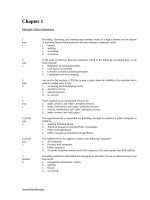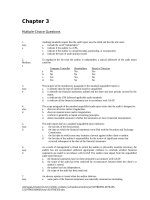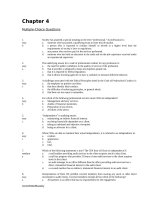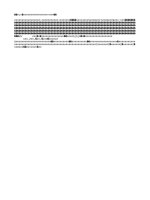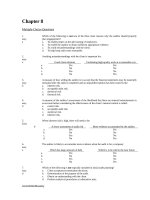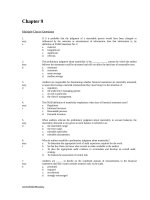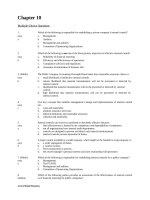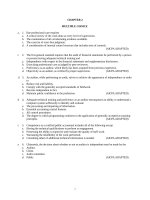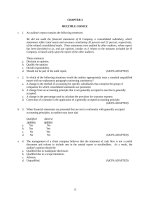Test bank auditing and assurance principles 5th by richiutte CH18
Bạn đang xem bản rút gọn của tài liệu. Xem và tải ngay bản đầy đủ của tài liệu tại đây (58.03 KB, 6 trang )
CHAPTER 18
MULTIPLE CHOICE
d
1. In addition to assessing the fairness of the entity's financial statements, a governmental financial
statement audit is concerned with evaluating
a. Internal control.
b. Efficiency.
c. Accuracy.
d. Compliance.
b
2. Statement on Auditing Standards No. 74, "Compliance Auditing Applicable to Governmental
Entities and to Other Recipients of Governmental Financial Assistance," describes an independent
auditor's responsibilities for all but which of the following?
a. Laws and regulations under generally accepted auditing standards.
b. Laws and regulations in conjunction with a regulatory agency's criteria.
c. The GAO's government auditing standards.
d. The Single Audit Act.
a
3. Under generally accepted auditing standards, an auditor's responsibility to detect and report
violations of laws and regulations is to
a. Assess the risk that violations of laws and regulations may cause materially misstated financial
statements and to design the audit accordingly.
b. Report all violations of laws and regulations to the U.S. GAO.
c. Detect all violations of laws and regulations, including those that are neither direct nor material.
d. Coordinate the search for violations of laws and regulations with all agencies from which the
entity has received financial assistance.
c
4. In assessing whether management has overlooked relevant laws and regulations, the auditor
would perform all of the following except
a. Obtain written representations from management.
b. Review relevant portions of grant and loan agreements.
c. Confirm grant arrangements with granting agencies.
d. Discuss laws and regulations with the entity's chief financial officer and legal counsel.
a
5. Program audits performed for governmental entities include
a. Determining the extent to which the desired results or benefits established by the legislature are
being achieved.
b. Determining whether the entity is acquiring resources economically and efficiently.
c. Determining whether the financial statements are presented fairly.
d. Determining whether the entity has adhered with specific financial compliance requirements.
127
d
6. In a governmental financial audit, the auditor is required to test an entity's compliance with
applicable laws and regulations and to prepare a written report that provides all of the following
except
a. Positive assurance on items tested.
b. Negative assurance on items not tested.
c. A description of material instances of noncompliance for items tested.
d. A description of the entity's performance on major financial assistance programs.
c
7. Under government auditing standards issued by the U.S. GAO, a report on internal control should
address all of the following except
a. The entity's internal control categories.
b. The scope of the work performed in obtaining an understanding of the entity's internal controls.
c. The auditor's opinion on the appropriateness of the internal control in complying with future
grants.
d. Deficiencies in internal control not significant enough to be considered reportable conditions
under SAS No. 60, "Communication of Internal Control Structure Related Matters Noted in an
Audit."
a
8. In which of the following circumstances would a governmental entity have the option of not
complying with the Single Audit Act?
a. Governmental entities receiving less than $25,000 per year.
b. Governmental entities receiving over $1,000,000 per year.
c. Governmental entities receiving over $500,000 per year.
d. Governmental entities receiving over $100,000 per year.
c
9. In an audit of a governmental entity under the Single Audit Act, which of the following questions
are not appropriate?
a. Are the costs reasonable and necessary?
b. Do the costs conform to applicable grant requirements?
c. Are the costs the result of purchases made by competitive bid?
d. Are the costs net of applicable credits such as purchase discounts?
c
10. To provide for the greatest degree of independence in performing internal auditing functions, an
internal auditor most likely should report to the
a. Financial vice-president.
b. Corporate controller.
c. Board of directors.
d. Corporate stockholders.
b
11.
a.
b.
c.
d.
d
12. Taylor Sales Corp. maintains a large full-time internal audit staff, which reports directly to the
chief accountant. Audit reports prepared by the internal auditors indicate that the system is
functioning as it should and that control risk is low. The independent auditor will probably
a. Eliminate compliance testing.
b. Increase tests of controls.
An independent auditor might consider the procedures performed by the internal auditors because
They are employees whose work must be reviewed during substantive testing.
They are employees of the client, but their work might be relied on.
Their work impacts upon the cost-benefit tradeoff in evaluating inherent limitations.
Their degree of independence may be inferred by the nature of their work.
(AICPA ADAPTED)
128
c. Avoid duplicating the work performed by the internal audit staff.
d. Place limited reliance on the work performed by the internal audit staff. (AICPA ADAPTED)
a
13. When an independent auditor decides that the work performed by internal auditors may have a
bearing on the nature, timing, and extent of contemplated audit procedures, the independent
auditor should plan to evaluate the objectivity of the internal auditors. Relative to objectivity, the
independent auditor should
a. Consider the organization level to which internal auditors report the results of their work.
b. Review the quality control program in effect for the internal audit staff.
c. Examine the quality of the internal audit reports.
d. Consider the qualifications of the internal audit staff.
(AICPA ADAPTED)
b
14. In connection with the audit of financial statements by an independent auditor, the client suggests
that members of the internal audit staff be utilized to minimize audit costs. Which of the
following tasks could most appropriately be delegated to the internal audit staff?
a. Selection of accounts receivable for confirmation, based on the internal auditor's judgment as to
how many accounts and which accounts will provide sufficient coverage.
b. Preparation of schedules for negative accounts receivable responses.
c. Evaluation of the internal control for accounts receivable and sales.
d. Determination of the adequacy of the allowance for doubtful accounts. (AICPA ADAPTED)
c
15. Which of the following activities is typically associated with operational auditing?
a. Determining whether the financial statements are an accurate representation of the entity's
operations.
b. Evaluating the feasibility of attaining the entity's operational objectives.
c. Making recommendations for improving performance.
d. Reporting on the entity's relative success in meeting profitability goals.
b
16. The overall objective of internal auditing is to
a. Design and implement an effective internal control structure.
b. Assist the independent auditors in gathering evidence needed to form an opinion on the fairness
of the financial statements.
c. Ensure that assets are properly accounted for and protected from loss or misuse.
d. Provide information about any phase of business activity to assist members of management in
discharging their responsibilities.
d
17.
a.
b.
c.
d.
b
18. For an internal auditor to render impartial and unbiased judgments, he or she must be independent
of the entity's
a. Stockholders.
b. Personnel and operating activities.
c. Independent (external) auditors.
d. Board of directors.
c
19. In a financial statement audit, the independent auditor would not rely on the work of an internal
auditor in
Usually, an operational audit is performed
By independent external auditors.
By a team consisting of an equal number of external and internal auditors.
Only when an operating division is experiencing declines in productivity or profitability.
By internal auditors at the request of top management or the board of directors.
129
a.
b.
c.
d.
Obtaining an understanding of the internal control structure.
Assessing risk.
Determining a preliminary estimate of materiality.
Performing substantive tests.
SHORT ANSWER
1. Explain the purpose of economy and efficiency audits.
Answer:
Economy and efficiency audits determine:
Whether an entity acquires, protects, and uses resources economically and efficiently,
The causes of diseconomies or inefficiencies, and
Whether the entity has complied with laws and regulations that bear on economy and
efficiency.
2. Explain the purpose of program audits.
Answer:
Program audits determine:
The extent to which a program achieves the results or benefits established by the
granting legislature or authorizing body,
The effectiveness of an organization, program, activity, or function,
Whether the entity complies with laws and regulations applicable to the program.
3. Explain the purpose of the Single Audit Act of 1984.
Answer:
Congress enacted the Single Audit Act of 1984 which was intended to improve the financial
management of state and local governments receiving federal funds, establish uniform audit
requirements for federal grant recipients, promote efficient and effective use of audit resources,
and ensure that federal departments and agencies rely on one audit report only: the single audit
report. In 1996, the Single Audit Act Amendment amended the Act.
4. An internal auditor and his/her staff attempt to familiarize themselves with the specific activity to
be reviewed. Describe the preliminary considerations for familiarizations.
130
Answer:
Review the internal audit working paper files and reports from prior operational
audits.
Discuss and coordinate the timing and scope of the review with the manager of the
activity to be audited.
Coordinate staff requirements with the director of internal auditing to assure that the
operational audit can be completed on time.
5. An internal auditor’s documented evidence should be examined on a test basis to provide an
independent auditor with a basis for judging the adequacy and appropriateness of the internal
auditor’s competency and objectivity in what areas of internal audit work?
Answer:
The scope of internal audit work
Audit programs
Working paper documentation
Conclusion reached
Any reports prepared
PROBLEMS
1. Complete the following chart with information relating to financial statement auditing,
compliance auditing, and internal auditing. Information needed to complete the chart will include
the type of audits completed for each area of auditing and also the standards that govern the
different areas of auditing.
Area of Auditing
Financial Statement Auditing
Type of Audits
Compliance Auditing
Compliance Auditing
Internal Auditing
131
Standards
Answer:
Area of Auditing
Financial Statement Auditing
Type of Audits
Financial Statement Audit
Compliance Auditing
Financial Audit
Compliance Auditing
Performance Audit
Operational Audit
Internal Auditing
Standards
Audit AICPA: Generally
Accepted Auditing Standards
GAO: Government Auditing
Standards
GAO: Government Auditing
Standards
IIA: Standards for the
Professional Practice of Internal
Auditing
2. Complete the operational audit function that relates to each scientific method listed below.
Scientific Method
Observe and recognize a problem
Operational Audit Function
Formulate hypothesis
Gather relevant verifiable evidence to test
hypothesis
Evaluate evidence
Develop conclusions
Answer:
Scientific Method
Observe and recognize a problem
Operational Audit Function
Management requests an operational audit
familiarization with the operational activity to be
reviewed.
Overall hypothesis: The accounting, financial, or
operating control is operating properly and relevant
to the control’s objective.
Select appropriate operational audit procedures and
gather sufficient competent evidential matter.
Formulate hypothesis
Gather relevant verifiable evidence to test
hypothesis
Evaluate evidence
Evaluate evidential matter to determine if the
hypothesis is supported, refuted, or inconclusive.
Report to the appropriate organizational level.
Develop conclusions
132
